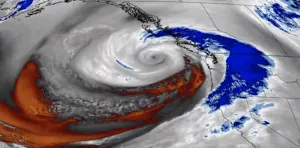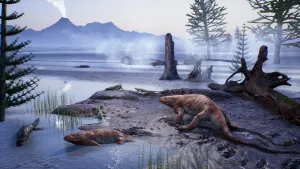
UN report provides roadmap to accelerate green transition
The Making Peace With Nature report from the United Nations says that public health and nature are intertwined.
Humanity is in the midst of a triple-pronged planetary emergency on the verge of spiraling out of control, warns a new report from the United Nations (UN). The Making Peace With Nature report also offers a blueprint on how to tackle the interconnected climate, pollution, and biodiversity breakdowns.
Human activity is devastating ecosystems, pushing hundreds of thousands of species toward extinction. The impacts of climate change are accelerating and the world is being flooded by an unprecedented tide of pollution, says Making Peace With Nature, a year-long synthesis of several major UN scientific assessment reports.
“As scientists, the more we learn about what is happening, the more worried we’ve become,” said the report co-lead author Sir Robert Watson, former chair of both the Intergovernmental Panel on Climate Change (IPCC) and Intergovernmental Science-Policy Platform on Biodiversity and Ecosystem Services (IPBES).
“The risks humanity faces are far worse than they were 20 or even 10 years ago,” Watson told The Weather Network in an interview.
Transformational societal change needs to happen this decade, yet not one country is on the right path, said Watson.

David Trood. DigitalVision. Getty Images.
The well-being of today‘s youth and future generations depends on an urgent and clear break with current trends of environmental decline the UN Environment Programme (UNEP) sponsored report warns. Ending this civilization-threatening decline requires a reduction in carbon dioxide emissions by 45 per cent by 2030 compared to 2010 levels and reaching net-zero emissions by 2050. It will also require conserving and restoring biodiversity and minimizing pollution and waste.
To accomplish these goals to tackle the climate, biodiversity, and pollution crises together requires sweeping changes in governance, and the economic and social organization of society. These, along with our world-views, norms and values, will need to be based on the fact that humanity is dependent on nature for our survival and well being.
Here’s three systems in need of urgent transformation:
1. TRANSFORM THE ECONOMIC SYSTEM
The world’s economic and financial systems are the major contributors to the triple environmental emergencies and require urgent reform the report said. Eliminating the up to US $7 trillion that governments spend yearly on harmful subsidies, such as those for the fossil fuel industry is a good place to start said Watson. Over US $5 trillion in subsidies for fossil fuels drive wasteful production and consumption of energy, degrades ecosystems and increases pollution.

Nick David. Stone. Getty Images.
A country on the right path would be shifting all of its harmful subsidies to help make a change over to low-carbon energy, sustainable agriculture, forest and ocean protection while reducing pollution, said co-lead author Ivar Baste of the Norwegian Environment Agency.
This ideal country would also change its business and societal incentive structures to reflect the value of nature, create green jobs, and develop a circular economy to minimize resource use, said Baste in an interview.
It would also use new measures to assess its economic performance such as Genuine Progress Indicators or Inclusive Wealth. GDP (gross domestic product) only measures current income, but does not show whether that income is sustainable.
“If you don’t measure the right thing, you don’t do the right thing,” Nobel prize-winning economist Joseph Stiglitz has said previously about GDP.
2. TRANSFORM FINANCE AND INVESTMENTS
Banks, pension funds, and others need to stop investing in environmentally harmful activities like large-scale logging, said Watson. Governments and regulators need to make the rules and incentives of finance reality-based and use full national capital accounting. Those rules and incentives need to shift investments toward economic activities that enhance forests, wetlands, soil conservation, fresh-water systems, and other ecosystems upon which human prosperity depends.

Andrii Lutsyk/Ascent Xmedia. DigitalVision. Getty Images.
3. TRANSFORM GOVERNANCE THROUGH POLYCENTRIC DECISION MAKING
Although countries have long agreed to eliminate harmful subsidies in energy, agriculture, fishing, mining, and industries that export commodities, only a few countries have actually done so. This failure by governments to protect the future well-being of its citizens illustrates the disproportional influence of vested interests, said Watson.
The report calls on countries and institutions to shift to polycentric systems of governance, the report said. These are collaborative forms of decision making involving a full range of actors in the public, private, and civil society sectors.
“The public must have a stronger voice to ensure the transformations can be just, informed, effective, and not subject to political opportunism,” he said.
RECOVERY FROM PANDEMIC MUST BE GREEN
The COVID-19 crisis made it clear that the health of people and nature are intertwined, said Inger Andersen, Executive Director of UNEP. “[The] crisis has underlined the need for a step-change in how we view and value nature,” Andersen said in a release.
“‘Green recovery’ plans for pandemic-hit economies are an unmissable opportunity to accelerate the transformation,” she said.
These recovery efforts should be channelled into sustainable infrastructure and programmes that address the issues of habitat destruction, wildlife trade, and other human-nature interactions that increase exposure to zoonotic diseases, the report says.
Making Peace With Nature report will be presented to representatives of the world’s governments on 19 February at The UN Environment Assembly, which is the world’s highest environmental decision-making body.
Thumbnail credit: David Trood. DigitalVision. Getty Images.











